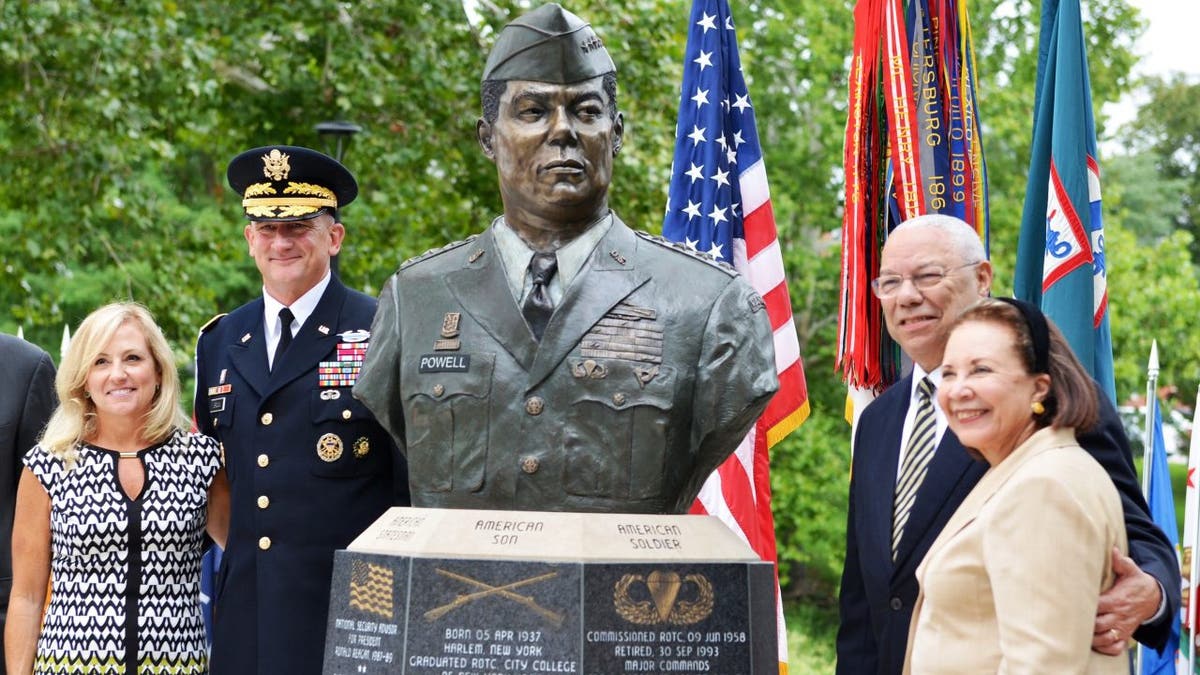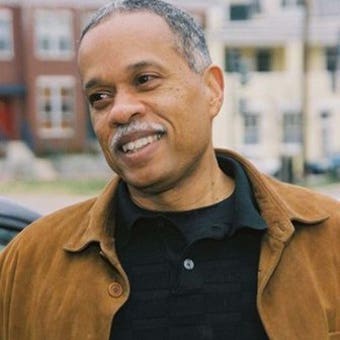US mourns death of Colin Powell who once said, 'Never lose faith in America'
Jennifer Griffin has the latest as the US mourns the death of a soldier, military giant on 'Special Report'
Gen. Colin Powell and I shared a love of American history. But he had special love for the history of African Americans in the military.
Powell was the driving force to get a monument built to the Buffalo Soldiers at Fort Leavenworth, Kansas in 1992.
COLIN POWELL, FORMER SECRETARY OF STATE, DEAD AT 84 FROM COVID-19 COMPLICATIONS
And he was thrilled 22 years later when a bust was placed in Buffalo Soldier Memorial Park to honor the black four-star general who became the nation’s first black Chairman of the Joint Chiefs of Staff – Colin Powell.
He once told me that if you shook him in the middle of the night and asked him to identify himself he’d say he was an American soldier.
That pride in being an American soldier was bigger than stars and medals on his uniform.
BUSH REMEMBERS POWELL AS ‘GREAT PUBLIC SERVANT’
The pride came from his core belief that it was the military that gave him, the black son of immigrants, the chance to prove himself despite racism.
Gen. Colin Powell once told me that if you shook him in the middle of the night and asked him to identify himself he’d say he was an American soldier.
Listen to Powell talking about black military history – well, really talking about himself:
"Every war we’ve ever been in, blacks stepped forward because it was the one place they could demonstrate equality," Powell told me in a 2006 interview for the "History Makers," a series of interviews with prominent black Americans that was broadcast on PBS.
"They weren’t slaves… They may be in segregated units, and they may not have gotten the same pay or rations or equipment as white soldiers, but nevertheless, they were able to show that they were as brave and courageous as any other group of Americans.
"And they also knew that every time they did that, they would [put] the lie of racial discrimination to the test," he said. "With every step forward, they knew there would be progress."
COLIN POWELL'S '13 RULES': READ THEM HERE
Powell was painfully blunt about the racism he dealt with as a soldier. He could not get a hamburger at restaurants in the south that enforced racial segregation against him as a Black man even as he wore the uniform in the 1960s.
This was the war on the home front against racism, in Powell’s mind.
One way to win that war, in young Powell’s mind, was establishing that Black people were equal to any other race in fighting for a nation based on a constitution protecting "the blessings of liberty" for all.

FILE – Former U.S. Secretary of State and former Chairman of the Joint Chiefs of Staff, retired General Colin Powell attends the unveiling of his bust among the Circle of Firsts at the Buffalo Soldier Monument, with his wife Alma at Fort Leavenworth, Kansas, U.S. September 6, 2014. Picture taken September 6, 2014. U.S. Army/Handout via REUTERS.
That meant Black soldiers battling overseas but also inside the U.S. as models of patriotism and that was the case when Buffalo Soldiers fought to protect settlers and the westward expansion.
GEN. TATA: COLIN POWELL TRANSCENDED POLITICS, THE NATION COULD LEARN FROM HIS LIFE
Here is Powell at the Buffalo Soldiers’ monument talking about his initial concept for the statue when he was at Fort Leavenworth as a brigadier general in the 1980s:
"I wanted an equestrian statue…" he said. "I wanted on that horse a trooper in his uniform just like white soldiers would wear. I wanted him to have ‘U.S.’ on his uniform…There would be no doubt that he was an equal, equal to any other soldier in the U.S. Army."
Powell’s insistence on the monument sending the message of racial equality is in line with belief that black soldiers earned the right to equality.
"Blacks were always brought into military service when there was a need for additional bodies and blood," he said.
"But when the conflict was over, then blacks were sent back into servitude. And it was the case in the Revolutionary War, where [President George Washington] had…blacks serving under him. It was the case in the War of 1812 when black men were promised their freedom and property if they fought for their country. They didn’t receive that. But nevertheless, they fought."
And their fight, to Powell, was every bit as important as Dr. Martin Luther King’s historic marches and speeches that fueled the fight for racial equality.
It was every bit as important to Powell as Thurgood Marshall’s historic fight in courtrooms to end the laws of segregation.
CLICK HERE TO GET THE OPINION NEWSLETTER
It bears repeating that he logic behind Powell’s reasoning went like this: No one can question a man’s equal worth if that man and his brothers sacrifice their blood, risk their lives to defend the nation.
Powell bragged about the military as "the most integrated institution in American society," in his "History Makers" interview with me. It achieved that standing by allowing people to "move up based on performance."
That is why Powell never missed an opportunity to educate people about black people who stood up to defend a nation that treated them as second-class citizens. He loved to recount to me the history of blacks in the military, from the Buffalo Soldiers to the Montford Point Marines to the Tuskegee Airmen to the Golden Thirteen in the Navy.
More from Opinion
I first met Powell when I covered President Reagan’s administration as the White House correspondent for the Washington Post. He was a top National Security official eventually becoming National Security Adviser.
We were both the sons of Jamaican immigrants who came to America in search of a better life for their children and settled in New York City -- his family in the Bronx, mine in Brooklyn.
CLICK HERE TO GET THE FOX NEWS APP
But Powell made his way to unique heights in America life as a military man. He loved the American military for giving him that gift.
If you ever have a doubt, look at the incredible, inspiring bust of Powell, the black immigrants’ kid, in Buffalo Soldier Memorial Park at Fort Leavenworth.














































